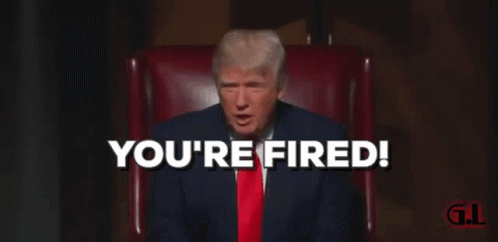If you read this newsletter regularly — and I hope you do! — you know that my mind space has been occupied a whole lot lately by the one-year anniversary of being let go by CNN. (I wrote about that, in depth, here.)
(Sidebar: I occasionally get emails or notes from people telling me to “just get over it” or “stop writing about it.” Which I get! I am not trying to beleaguer this or anything. It just was (and is) a seminal moment in my life, a time in which my plans were derailed in a major way. So it impacts a lot of how I think and what I do. And I am trying to make this newsletter as honest and transparent as I can. Thanks in advance for understanding!)
One thing I have been fascinated by in this whole process is how I — and other people — talk about what happened.
My mom, for example, insists I was “laid off.”
Twitter trolls, on the other hand, like to remind me — regularly! — that I was “fired.”
Which got me to thinking: What, exactly, is the difference between the two? Or are the terms basically interchangeable?
First, definitions.
“Fired” is to “dismiss (an employee) from a job.”
“Lay off” is to “discharge a worker because of economic conditions or shortage of work.”
In both cases, well, you don’t work there anymore. The difference, it seems, is the WHY you don’t work there anymore.
Getting fired, as best as I can tell, is for cause. You actively DID something wrong or bad.
Like, Matt Lauer was fired from NBC. Tucker Carlson was fired from Fox News. This is not debatable. So say we all.
Getting laid off is more passive. You were caught up in a reorganization. Or your boss left and the new regime wanted a change. Or the business was cutting costs. Or your whole division got eliminated.
In other words, you didn’t necessarily do anything obviously wrong. You were in the wrong place at the wrong time. Circumstances changed.
Which is basically how U.S. News and World Report defines the difference. They write:
The difference between being laid off and fired is who is at fault. Being fired means you are terminated from your job due to something that the company deems was your fault. If you are laid off, that means the company deems that they are at fault.
(There are LOTS of online discussion threads about this difference. I liked this one from Reddit.)
“Laid off” is definitely better then. “Fired” suggests that maybe this person isn’t employable, that there might be something defective there. “Laid off” doesn’t carry that connotation at all.
By my estimation then, I was laid off. CNN needed to make budget cuts — and could do so without major financial repercussions in a merger year — and I was someone who they deemed expendable in that environment. (Had they been on a digital kick — as they are now — I might still be there. Who knows?)
This is, quite literally, a semantic argument. But, I DO think it matters. Because I — and I am betting a lot of other people — never knew exactly how to describe what happened to me last year.
Getting “fired” seemed to overstate it while getting “laid off” felt a little like me spinning things to look as good as possible.
But, I now feel confident in saying I was “laid off.” That’s my story and I’m sticking to it.





Chris, you were laid off, as I was, along with approximately 1,500 others at Turner Broadcasting in November/December 2014. As a people manager at Turner, you couldn’t fire an employee without documentation and usually without putting the employee on notice and giving that individual a chance to improve. Neither of us was in that situation. Both of us were laid off, and I’m betting that someone in the Finance department looked at our salaries and benefits and determined that the bottom line would improve when the company didn’t have to pay those costs any longer. I couldn’t have done a better job. Indeed, the VP in my department told me so at a going-away party for myself and several others. You couldn’t have written more, been more insightful, been more witty or droll. It was the numbers for both of us. And that is the bottom line.
In the non-contract, at-will employee world, the difference is not semantic - it is monetary. If you are "fired" for cause, you are not eligible for unemployment. If you are "laid off", you are eligible. Often the "laying off" is a firing, but in order to not be heartless some managers and organizations label it as a lay off and eat the unemployment compensation.